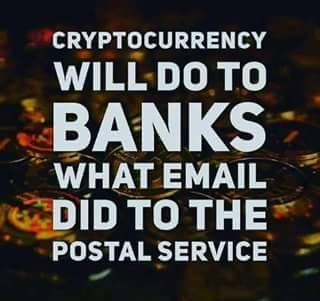
Now my mining operation is live; I have been working with my accountant to ensure we have clean books and report taxes correctly. One of the things we need for this is a business bank account.
This week, I had my application for an account with Metro Bank rejected, the third bank which has rejected me after Lloyds and Revolut. The latter the funniest, seeing as they promote themselves a Crypto friendly bank, allowing customers to buy and sell Crypto alongside their fiat accounts.
The reason for the rejection is always the same; we don’t deal with crypto businesses because of money laundering risks. This rejection is despite the fact that I have built and sold many companies, have no criminal record and can prove the existence of the mine and business operations.
Is this anything to do with money laundering or is this a case of turkeys voting for Christmas?
Earlier this week it was reported that the Polish Central Bank had been paying social media influencers to discredit Cryptocurrencies. YouTuber, Marcin Dubiel, was thought to have been paid in the region of $27,000 to post videos with titles such as “I LOST ALL THE MONEY?!” It turns out Dubiel, who has over 900,000 followers, wasn’t the only YouTuber to have been paid by the bank to produce anti-crypto propaganda.
Late last year, China, a country known for having some of the strictest capital controls in the world, blocked its citizens from trading Crypto by banning and blocking exchanges and outlawing ICOs. Vietnam followed suit weeks later.
Banks in the UK have also hit the headlines recently for no longer allowing people to buy Crypto with credit cards, although few media outlets bothered to mention that people have never been able to buy stocks and shares, or property on credit either.
Furthermore, property buyers trying to use Crypto profits to put down deposits on houses are being blocked by UK mortgage lenders as they couldn’t verify the source of these funds. Yes, back to anti-money-laundering. Now Crypto is going mainstream we are all money launderers, right?

Why can’t we just prove where the Crypto came from? Surely if I bought the Bitcoin on Coinbase, then this isn’t money laundering? If I put £500 into my bank account am I then required to prove the journey each note has been on and whether any of them have been used for criminal activities. Of course not.
Crypto is different. Crypto is a threat to the banks.
Where banks were previously dismissive of Crypto, considering it a fad, the rapid growth over the last year has highlighted many weaknesses in the traditional banking system. Is their answer to modernise? Nope. We have all out war. Why? Because they are scared. And they have every right to be.
The market cap of the Crypto market exploded from around $17.7 billion at the start of Jan ’17 to nearly a trillion dollars at its peak. While that’s just a fraction of the $5 trillion that circulates daily in the conventional currency markets, it was enough to draw the attention of key players.
Jamie Dimon, the billionaire, Chairman, CEO and President of JP Morgan Chase — America’s largest investment bank — led the charge, repeatedly calling Bitcoin a fraud. “If you’re stupid enough to buy it, you’ll pay the price for it one day,” he said, even threatening to fire staff who had bought into Bitcoin. He said later that he regretted calling it was a fraud, oh, that was just about the same time that JP Morgan started trading bitcoin futures.
Cryptocurrencies present a real threat to the fundamental model of banks, the financial middlemen, who make money charging you fees to store and use your money, which they lend out to others and charge interest on.
Crypto is the disrupter of the banking world. And what do disrupters do? They cut out the middleman, increasing choice and reducing cost:
Why wander down to the video store when you can download from Netflix?
Why have 100’s of CDs when you can access any song at any point with Spotify on your phone?
Why deal with dickhead estate agents anymore when you can use Purplebricks?
Cryptocurrencies are the disrupters that threaten the use case of banks. We have already see this in countries with challenging economies, where banks can steal your money, or economic mismanagement can devalue it before you have the chance to spend it. Look at Venezuela and Zimbabwe where Crypto is sold at a premium.
But banks are a safe place to keep your money right? When you deposit money with a bank, you are merely given an IOU. Ask the people of Cyprus how reliable those IOUs are.
Technology has disrupted many traditional industries by making things cheaper, universal and faster. So in what way has technology modernised the banking industry? Ok, so we have a mobile app to make the interface a little easier to navigate but have interest rates improved? No. Has the transaction speeds improved? No. Have account fees been removed? No. Has the cost of international remittance been reduced? No.
What happens when you slip into your overdraft on one account but are in credit on another? Do they aggregate? No. Despite you not being in debt to the bank but one ledger being in overdraft, you get a whopping overdraft fee.
So what do we need banks for? Mortgage? Nope, we can go to any mortgage provider for that? Loans? Nope, we can go to any loan provider for that. We can buy any financial service we want from any provider.
We need banks to hold out fiat and for buying things, and this is the threat:
If we keep our savings in Crypto, then the banks have a smaller pool of money to lend from
If we buy things using Crypto, the banks are making less money on debit fees
Every financial service we use Crypto for, we are taking a service away from the banks. And beyond fancy new mobile-only banks and biscuits for your dogs at Metro, nothing in banking has been disrupted. Until now.
But can Crypto take on the role of the bank? Yes, and here is why using Bitcoin as the primary example.
Bitcoin Can Be a Store of Value
Yes, we are all aware Bitcoin is volatile but so is the gold market (over a longer time frame), so are FIAT currencies and it is likely that over time we will see the volatility of Bitcoin reduce as adoption grows. Further, as a store of value, Bitcoin is the financial store which has increased in value the most over the last nine years. Will it continue to grow, sure? Over a long enough time frame the value of Bitcoin will always increase against fiat, it is deflationary by nature against increasing demand.
Bitcoin Is a Medium of Exchange
It’s fast, it’s efficient, and it’s relatively low cost. I transferred $250,000 to China for mining gear in seconds, with no hassle, low fees and no questions. Imagine trying to do that with your Lloyds debit card.
Bitcoin Is Transparent
Are banks transparent? Did you watch The Big Short? Also, keep in mind that the US Federal Reserve has consistently refused to allow an independent audit of its massive $4.5 billion balance sheet. Is that transparency?
The argument that every naysayer has about Bitcoin being used by criminals for sex trafficking and drug dealing because it is untraceable is bollocks. Only an idiot would use Bitcoin for criminal activity as their entire transaction history is traceable. The record is publicly accessible and is increasingly being used by companies such as Chainalysis or Blockseer to help investigators track the transactions of criminals. All addresses eventually lead to an exchange, who will provide details to whoever shows them a court order.
If you are buying a truckload of cocaine with Bitcoin you will likely be next up for America’s Dumbest Criminals.
Bitcoin Can’t Manipulated
Traditional banking is open to manipulation. The financial crash of 2008 was caused entirely by banks manipulating an opaque system. As you know, it was the frustration with the corrupt banking system that Bitcoin evolved from. The blockchain, on which Crypto is based is a permanent record that is validated by multiple sources meaning one company, business or nation, can’t fuck with it for their advantage.
Also, remember that most banks operate on fractional reserves. This is where the banks leverage money. They are lending more money than they have. If everyone went to the bank on the same day to withdraw all their funds, then the bank would fail. They don’t have it.
With Bitcoin, there is no leveraging. You have it in your wallet, or you don’t.
Bitcoin Is Deflationary
FIAT money relies on the authority of the state for credibility. Central banks manage its price and quantity. FIAT money is not capped, and the state banks can just print more money when needed; therefore the money slowly decreases in value.
The Argentinian Peso of the 1980s and the Zimbabwean Dollar of the 2000s both saw hyper-inflation due to civil unrest, political turmoil and economic decline that essentially totally crashed their currency making it worthless. Fuck, even the pound dropped 13% in a day after the announcement of Brexit in 2016. Bitcoin is capped at 21 million coins, which limits the risk of devaluation. As it is not linked to any single nation-state, it is far less likely to be affected by any political or civil unrest.
The State Can’t Steal Bitcoin
In 2013, when Cyprus run out of money, they decided to take up to 60% of the savings of anyone who had more than 100,000 Euros in their bank account. Greece threatened a 30% haircut of savings of over 8,000 Euros. The federal government of the United States forced everyone who owned gold during the Great Depression to sell it to the state at a knockdown price, so don’t tell me the government wouldn’t ever steal your money.
Crypto can do everything that banks can do and more, circumnavigating traditional financial systems, leaving banks out of the loop. Crypto is therefore making banks increasingly redundant, and banks are fully aware of the danger of that. That’s why now they are starting to pile on the pressure.
So far it is a battle they aren’t winning. The more they fight Crypto, the more resilient it proves.
Hi! I am a robot. I just upvoted you! I found similar content that readers might be interested in:
https://medium.com/datadriveninvestor/the-banks-are-scared-of-cryptocurrencies-and-so-they-should-be-7e35ebf1f2e6